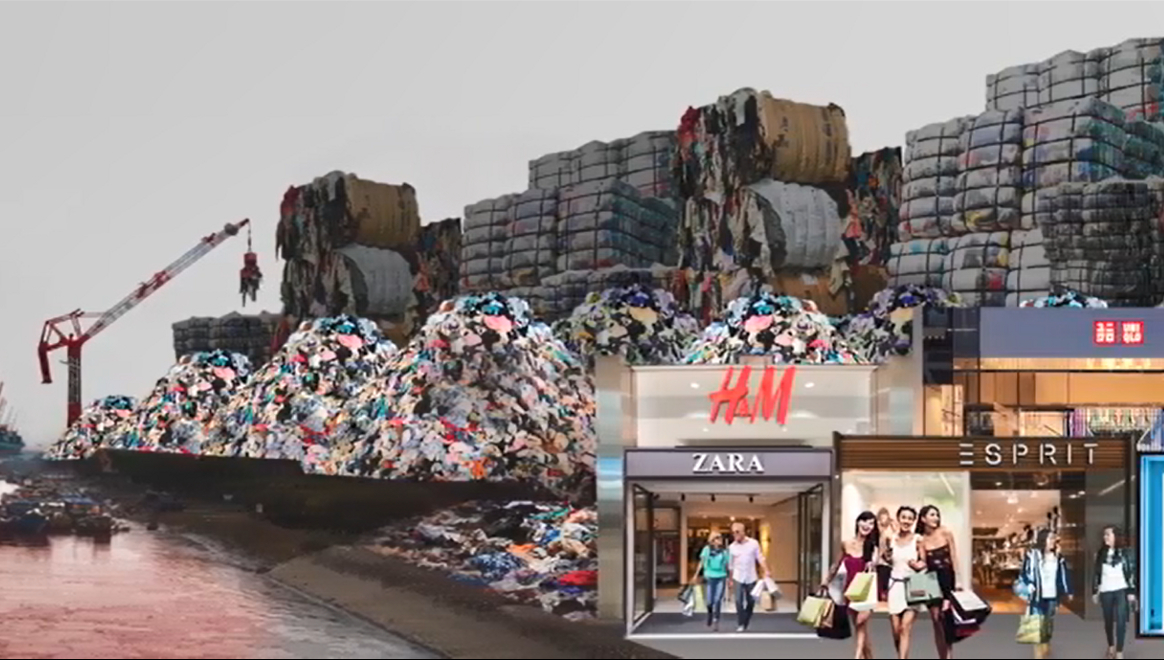
(Picture Courtesy: Greenpeace)
One of the key actions suggested by RSA to address the Fast Fashion’s Plastic Problem is that the government should explore a per-item ‘plastics tax’ on clothing imported into or produced in the UK containing virgin plastics.
Fast Fashion’s Plastic Problem
In recent years a number of fashion brands have stated their commitment to investing in sustainable fashion. The Royal Society of Arts, Manufactures and Commerce (RSA) analysed over 10,000 items of clothing from across some of the UK’s leading fast fashion brands to see if any progess has been made.
Over the past few decades, fast fashion has boomed. We now buy more clothing than we ever have. The way we shop has changed dramatically too, and what was once the domain of the high street has shifted online with new companies and brands overtaking, and even buying up, traditional players in the industry.
This meteoric growth has not come without issues. Fast fashion brands have come under fire for their poor social and environmental records, and dire working conditions have been exposed in the UK and further afield. The extraordinary impact of today’s fashion industry across waste, water, soil and air pollution is well documented.
The scale of plastic use within fast fashion is still little known amongst the public. Synthetic fibres, such as polyester, nylon, elastane and acrylic, are made using fossil fuels, and the use of these fibres in fashion has dramatically increased in recent years, doubling between 2000 and 2020. These cheap fabrics have fuelled the explosion of fast, throwaway fashion. Production of synthetic fibres uses large amounts of energy, and are part of a petrochemical industry which is fuelling climate change.
RSA analysed over 10,000 items of clothing
RSA analysed over 10,000 items of clothing from across some of the UK’s leading online fast fashion brands, to shed some light on what goes into the clothes we wear. Looking at over 2,500 recently-added items each from Asos, Boohoo, Missguided and PrettyLittleThing, it was found that the average item is at least half plastic, and that as many as 88 percent of the items listed on some websites contain ‘virgin’ plastics. Recycled materials are only found in a vanishingly small number of products, despite retailers making big promises to shift toward
sustainable materials.
The key findings of the analysis are:
- Fast fashion is awash with new plastics – with as much as 88% of recently listed items containing new plastics on some websites.
- Online stores have been slow to adopt recycled materials in their clothing – for some stores just 1% of items contain recycled materials.
- Fast fashion shoppers may not be aware of the amount of plastics they are buying. Previous RSA research suggests just half of those who shop at fast fashion websites say they regularly buy clothes containing synthetic materials, despite plastics being highly prevalent in online stores.
- These companies are ‘greenwashing’ their images by producing small sustainable ranges, while the bulk of their output is still made from petrochemicals.
- Some companies have a mountain to climb if they are to meet their own sustainability targets.
One of the key actions suggested by RSA to address the Fast Fashion’s Plastic Problem is that the government should explore a per-item ‘plastics tax’ on clothing imported into or produced in the UK containing virgin plastics, in order to disincentivise the extraction of fossil-fuels destined to become clothing. Income from the tax could be used to invest in new innovations in biomaterials and circular economy infrastructure. The government should further introduce Extended Producer Responsibility commitments. They should explore routes for supporting businesses which take steps towards circular economy business models, such as reviewing VAT rates on repair services.





